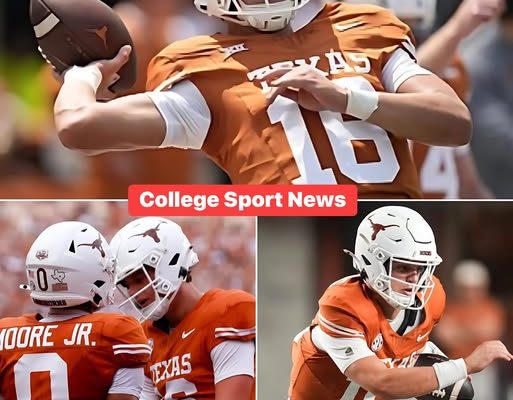Arch Manning’s journey into the national spotlight has been nothing short of fascinating, and after two weeks of the college football season, his Heisman Trophy odds have become one of the hottest conversations in the sport. The Texas Longhorns’ redshirt sophomore quarterback, who entered the year as a preseason favorite at +600, took a significant hit after a shaky Week 1 outing against Ohio State. In that matchup, the Buckeyes’ relentless defense bottled him up, holding him to 170 passing yards and intercepting him once in a game Texas lost 14-7. The performance raised eyebrows, dropped his odds to +1800, and gave ammunition to critics who questioned whether the legendary Manning name had prematurely inflated his Heisman stock. Yet as quickly as the doubters began to circle, Arch answered back with a performance in Week 2 that reminded everyone why he’s considered one of the most gifted quarterbacks in the country.
Against San Jose State, Manning erupted for five total touchdowns, four through the air and one on the ground, in a 38-7 rout that restored momentum for both himself and the Longhorns. Completing 19-of-30 passes for 295 yards, his stat line was impressive, but it was the style in which he delivered those numbers that really grabbed attention. The highlight of the night came on an 83-yard bomb to freshman wideout Parker Livingstone, a throw that showed off Manning’s signature arm strength and touch down the field. He also added a 20-yard rushing touchdown—his first ever as a starter—which underscored his development into a true dual-threat option under Steve Sarkisian’s system. Even with an interception in the red zone that stalled what could have been another scoring drive, Manning displayed composure, resilience, and playmaking flair that silenced critics and stabilized his Heisman odds back to +1300, tying him for the fourth-best mark in the nation.
Looking at the current Heisman landscape, Manning faces stiff competition. Oklahoma quarterback John Mateer leads the race at +800 after his breakout three-touchdown performance in an upset victory over Michigan. LSU’s Garrett Nussmeier sits close behind at +850, and Miami’s Carson Beck rounds out the top three at +1100. Manning’s positioning at +1300 is not a bad spot considering the early stumble; in fact, history suggests that the Heisman is rarely won in September but can be lost early if a candidate never recovers from a shaky start. The question, then, is whether Manning’s Week 2 explosion was a one-off performance against an overmatched opponent or the first glimpse of what will become a consistent campaign across the SEC gauntlet.
What works in Manning’s favor is the scheme and the talent around him. Sarkisian is widely regarded as one of the best quarterback developers in college football, and his offense is designed to maximize efficiency while creating opportunities for explosive plays. With weapons like Ryan Wingo on the outside, Livingstone emerging as a deep threat, and a solid running game to keep defenses honest, Manning has the kind of supporting cast that can make a Heisman season possible. If he maintains even close to the efficiency and explosiveness he displayed against San Jose State, a 4,000-yard, 40-touchdown season is well within reach, and those numbers would put him squarely in the conversation for the trophy as long as Texas continues to win.
The road ahead will test him in ways that Week 2 didn’t. Texas faces UTEP next, which should be another opportunity for Manning to pad his stats, but the true barometer will come in Week 3 when the Longhorns travel to face Florida in a marquee SEC showcase. That matchup will not only impact Texas’s season trajectory but also serve as a national referendum on Manning’s legitimacy as a Heisman contender. Perform well against a quality SEC defense on the road, and his odds could easily swing back toward single digits. Struggle again, and the questions will return with even greater intensity. It’s a delicate balance, and every throw from this point forward will be scrutinized under the Heisman lens.
When comparing Manning to his top rivals, one has to consider both individual production and team success. Mateer has Oklahoma off to a hot start, and his performance against Michigan vaulted him to the forefront of the conversation. Nussmeier has the pedigree and firepower at LSU to put up staggering numbers, while Carson Beck at Miami benefits from a favorable schedule and a team that looks ready to contend in the ACC. Manning, on the other hand, plays in the SEC, where each week is a battlefield filled with defensive talent, hostile environments, and opportunities to prove yourself on the biggest stages. If Texas can navigate that gauntlet and position themselves for an SEC title run, voters will have no choice but to weigh Manning’s contributions heavily, particularly given the pressure that comes with being the face of the program and carrying the Manning legacy.
The interception against San Jose State, while seemingly minor in the grand scheme of a blowout win, does highlight one area Manning must refine if he wants to truly separate himself. Turnovers in the red zone can cost a team in closer games, and Heisman voters tend to value quarterbacks who protect the football. Manning’s Week 1 pick against Ohio State was also in a critical spot, so limiting mistakes in scoring territory will be a key area of development moving forward. On the flip side, the rushing touchdown he scored and his 23 yards on the ground show a willingness to use his legs, which adds a dynamic element to his game that many of his competitors don’t possess at the same level. That dual-threat capability could give him an edge if he continues to integrate it effectively.
Beyond the numbers, though, is the narrative factor, which often plays a huge role in the Heisman race. Manning carries the most recognizable last name in college football, and that brings both added pressure and added attention. Voters are keenly aware of the storylines that drive the sport, and the possibility of Arch Manning hoisting the Heisman Trophy would be one of the most compelling in recent memory. That narrative boost, combined with strong performances, could help him in close races where statistics alone might not be enough to sway opinion. However, the Manning name also means the margin for error is slimmer. Every poor outing will be magnified, every interception dissected, and every missed opportunity questioned in ways that other candidates might escape.
As we move into the heart of the season, the Longhorns’ record will matter just as much as Manning’s stat line. Heisman winners almost always come from teams in the playoff hunt, and if Texas drops more games like they did in Week 1, Manning’s candidacy will suffer no matter how well he personally plays. That’s why the upcoming SEC stretch is so critical. UTEP is an appetizer, but Florida, Georgia, and Alabama down the line will define whether Texas is truly a contender. If Manning leads Texas to victories in those types of games while producing highlight-reel plays and gaudy stats, his odds will shorten significantly, and he could emerge as the frontrunner by November.
For now, the odds at +1300 feel appropriate. They reflect the potential for greatness combined with the reality of early inconsistency. They also serve as a reminder that the Heisman race is a marathon, not a sprint. September is about setting the stage, October is about building momentum, and November is about seizing the moment. Manning has done just enough through two weeks to stay firmly in the conversation, and his chance to climb higher is right in front of him.
What do you think? Are Arch Manning’s Heisman odds fair right now, or do you believe he deserves to be closer to the top after his five-touchdown showing? Do you see him as a legitimate threat to John Mateer, Garrett Nussmeier, and Carson Beck, or do you think the Longhorns’ early stumble will keep him on the outside looking in? Drop your thoughts in the comments—let’s hear your predictions for how Manning’s season unfolds and whether this could be the year a Manning finally wins the most prestigious trophy in college football.



